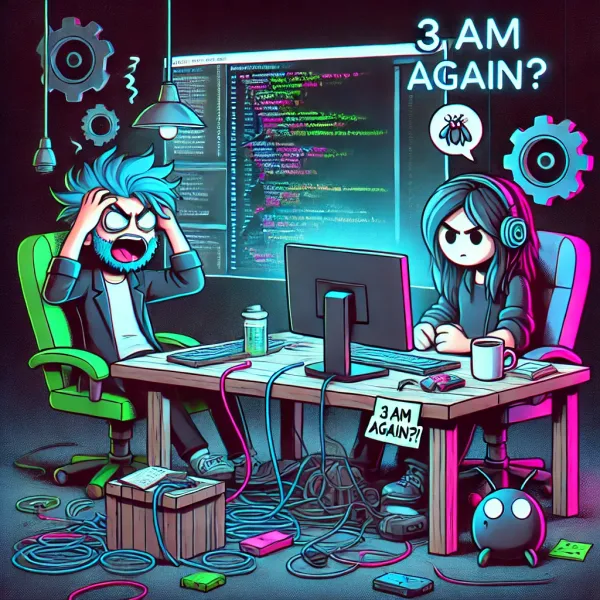Handling Differing Opinions in Teams: A Guide for the Brilliant but Occasionally Overbearing Developer
You ever sat in a meeting, staring at a teammate across the table, wondering how on earth they arrived at *that* conclusion? Don't worry—you're not alone. Handling differing opinions in a team is a skill as vital as debugging, but infinitely more challenging because, well, people aren't code.

You ever sat in a meeting, staring at a teammate across the table, wondering how on earth they arrived at that conclusion? Don't worry—you're not alone. Handling differing opinions in a team is a skill as vital as debugging, but infinitely more challenging because, well, people aren't code. You can't just rewrite someone until they make sense. Here's how you can navigate the chaos of human subjectivity with grace—or at least without losing your sanity.
1. Step One: Check Your Ego at the Door
Listen, we know you're smart. Your mom knows you're smart. That stack of certificates on your wall knows you're smart. But here's the thing: so is everyone else on your team (hopefully). Differing opinions usually don't mean that your colleagues are clueless; it means they see the problem differently. The first step to handling differing opinions is to pause your mental debate rebuttal and actually consider—objectively—that someone else's idea might just have merit. Who knows? You might learn something.
2. Seek to Understand, Not Just to Respond
You know that "Are you even listening to me?" face that your partner makes when you’re talking past each other about where to get dinner? That's the same look your teammate gives when you’re only pretending to hear them while planning your next verbal counterpunch. Real listening means putting in the effort to understand where your colleague is coming from. Ask clarifying questions, paraphrase what they said, and—brace yourself—even admit that their perspective could have some advantages. Not only does this build mutual respect, but it also makes the other person far more willing to hear your side.
3. Recognize the Beauty of Diverse Perspectives (Yes, Really)
I know—that sounds like it belongs on a motivational poster next to a kitten hanging from a tree branch. But it’s true. Differing opinions push us out of our comfort zones and challenge our assumptions. They force us to justify our decisions and create better, more robust solutions. If all you have are a bunch of yes-men (or yes-women), you’re not building anything innovative—you’re building an echo chamber.
4. Pick Your Battles
Not every opinion needs to become a hill to die on. As much as it might hurt to let a subpar (in your opinion) idea go forward, sometimes the best option is to let it happen and see what comes of it. If it succeeds, well, everyone wins. If it flops, there's a lesson for the entire team. Differing opinions often lead to decisions that are less about who is "right" and more about taking the best calculated risk. The beauty is, no matter the outcome, you're building team resilience.
5. Compromise Isn’t a Dirty Word
I know, I know—compromising on your perfect idea might feel like adding pineapple to a pizza. (And maybe you’re wrong about that, too, but we’ll save that for another day.) Compromise doesn’t mean you have to abandon your ideas. It means you find a way to combine everyone’s best thoughts to create a stronger solution. Think of it like merging Git branches: a little scary, a lot messy, but ultimately necessary to push forward.
6. It’s Not Personal—Until You Make It
Here's a golden nugget: attack the problem, not the person. It’s really easy for a disagreement about syntax, architecture, or (heaven forbid) tabs versus spaces to morph into a "Why does that guy hate me?" scenario. Keep the focus on the work. If you do find tensions running high, remember that humor can be an effective defuser. A well-timed joke (preferably not at someone's expense) can remind everyone that you're a team—working towards a shared goal, not trying to win the prize for Ultimate Code Alpha.
7. Facilitate, Don’t Dictate
If you’re in a leadership role, your job isn’t to crush differing opinions but to bring them into a coherent conversation. Instead of driving your point home with the delicacy of a sledgehammer, try acting as a facilitator. Invite quieter team members to share their views, and ensure dominant voices don’t drown others out. Good ideas often come from unexpected places—sometimes the intern who’s too nervous to speak up has the answer that will save everyone hours of headache.
Wrapping It All Up
Handling differing opinions in a team is part art, part science, and part just-not-being-a-jerk. When you embrace the messiness of human interaction instead of fighting it, you start to see that the friction of differing ideas can be incredibly productive. After all, the best solutions often come not from individuals but from diverse teams navigating disagreement and emerging stronger.
And hey, if nothing else, just remember: at least you’re not arguing with the code compiler. There’s no winning that one.




